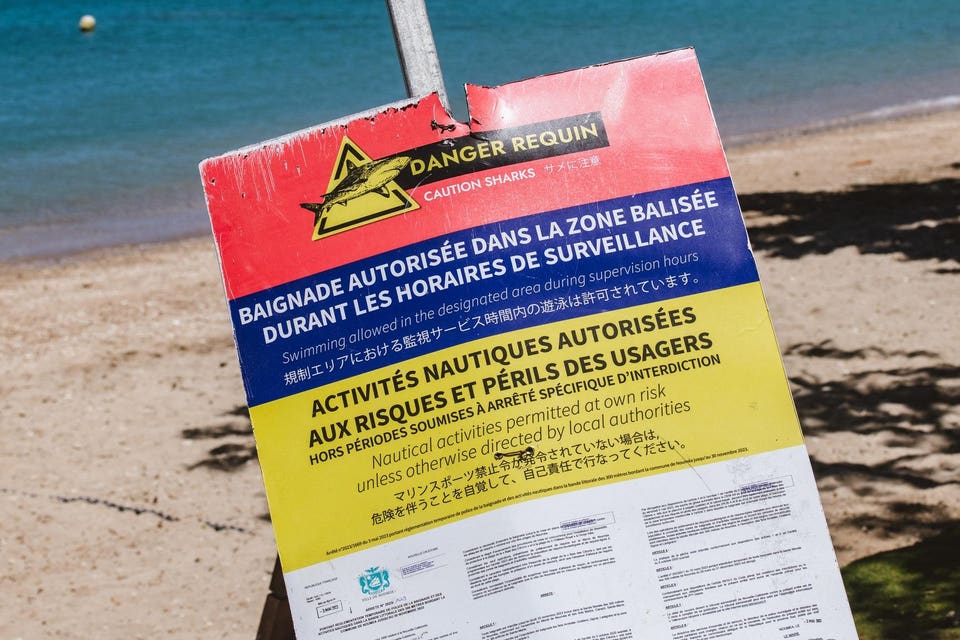Signage notifies of the danger of shark attacks and indicates the presence of a secured perimeter . . .
[+] for supervised swimming within a newly-installed maritime net barrier, at a beach along the Baie des Citrons bay in Noumea, New Caledonia, December 6, 2023. The town of Noumea reopened its beachfronts for swimming within secured zones protected by aquatic barriers preventing shark intrusions, following a months-long closure after a deadly shark attack on February 19. The 750-meter-long net secures a 10 hectar zone, while swimming outside safe-zones swimming is authorized but “at your own risk” reported the mayor’s office.
(Photo by DELPHINE MAYEUR / AFP) (Photo by DELPHINE MAYEUR/AFP via Getty Images) Shark culling – the government policy of capturing and killing large sharks – is controversial for numerous reasons. Not only does it disrupt marine ecosystems by removing apex predators, result in the unintentional capture of non-targeted species, and often lack a solid scientific foundation. So when New Caledonia decided to cull sharks in response to a series of attacks last year, including a fatal incident involving an Australian tourist, many were outraged.
“Culling campaigns rarely work, they only serve to appease the population because of the emotion surrounding shark incidents,” shark scientist and behavioural ecologist Johann Mourier told media outlets last year. The sharks also hold a sacred place in indigenous Kanak culture, with many members speaking out against the hunt . “Sharks have a cultural importance for Kanak people … they need to be valued,” Jean-Baptiste Juhel, a researcher in marine biology, explained.
Close up of Bull Shark, Carcharhinus Leucas, swimming underwater towards camera. (Photo by: . .
. [+] Universal Images Group via Getty Images) Yet a court in New Caledonia’s capital, Noumea, has ordered authorities to stop the practice, deeming the systematic culls “disproportionate in regard to the aim of protecting human life,” as revealed in a judgment made public on December 28. The ruling was prompted by a complaint filed by the environmental group Ensemble pour la Planète (EPLP).
The president of EPLP, Martine Cornaille, hailed the decisions as a denouncement of the “lightness of public authorities when it comes to the environmental consequences of their policy. ” Expressing concerns about the lack of scientific evaluation on the impact of the culling programs and the absence of data on populations of targeted shark species, the court highlighted the need for a more measured approach. But despite many being satisfied with the ruling, concerns linger within the EPLP group as the court decision did not outright prohibit future culling campaigns, leaving room for potential adjustments.
According to the Florida Museum of Natural History , New Caledonia has witnessed a rise in shark bites in recent years, bumping it’s rank to 13th globally for the number of incidents. Meanwhile, analysis of figures provided by municipal authorities and local media reports indicate that of 329 sharks caught, 202 were bycatch – and many of those as bycatch were endangered species (like lemon sharks and hammerhead sharks). Tiger shark, Galeocerdo cuvieri, are incredibly impressive and large sharks and reach a length of .
. . [+] about six meters with a wide mouth and broad nose.
The name comes from the striped pattern on the back of a gray animals, which in adulthood fades. In tropical waters Tiger sharks are considered the most dangerous shark species according to the International Shark Attack File. (Photo By: Education Images/Universal Images Group via Getty Images) The government also included a temporary ban on swimming at most of Noumea’s beaches and the installation of a metal net at Baie des Citrons, one of the city’s busiest beaches.
While municipal authorities claim the net is a success, critics, including scientists and environmental groups, argue that it threatens biodiversity. Bastien Preuss, a marine biologist based in Nouméa, says on top of the ecological ramification the net could have, it does not tackle the root causes of the shark attacks: “Local fisheries fed sharks for over a decade and suddenly stopped, now fishing boats empty out thousands of litres of fishing juice onto the bay every day, constantly attracting sharks. So much public money has been poured into culling campaigns and barriers, but there are still some major issues we need to address [including] the sewage system.
” Despite there being alternatives to the nets, such as proposed drone surveillance and smart drumlines, authorities plan to install two more nets this year, further raising concerns about the long-term impact on marine ecosystems. .
From: forbes
URL: https://www.forbes.com/sites/melissacristinamarquez/2024/01/12/court-orders-end-to-shark-culling-in-new-caledonia/



